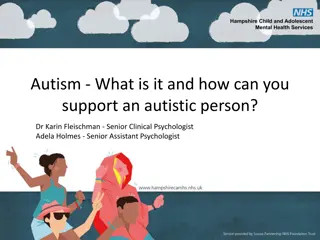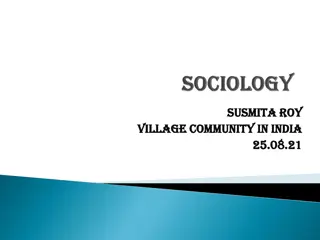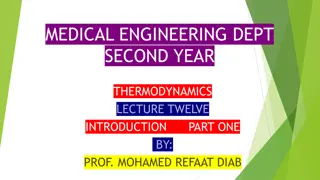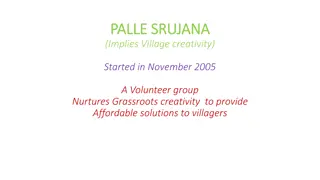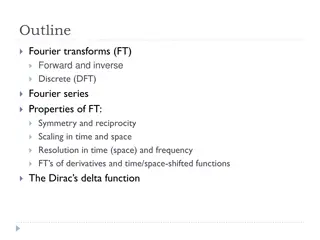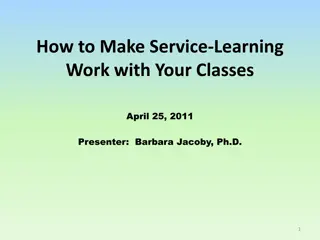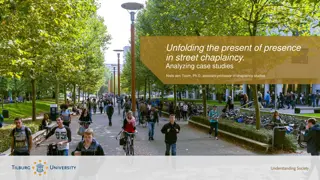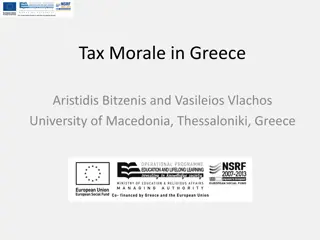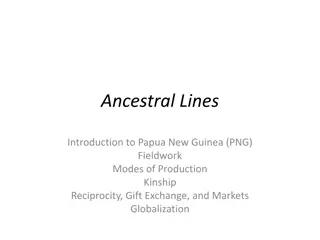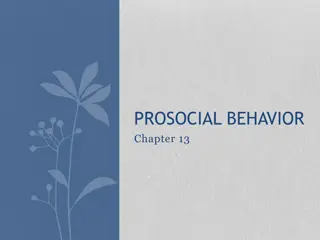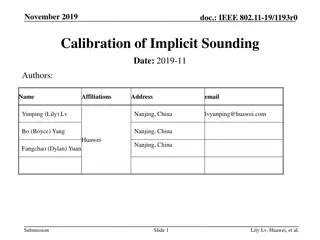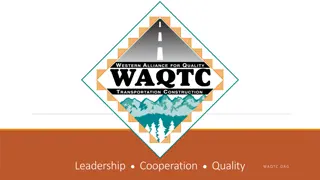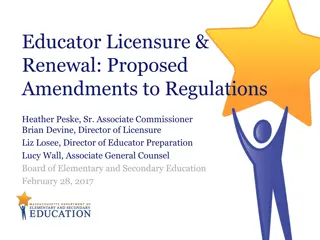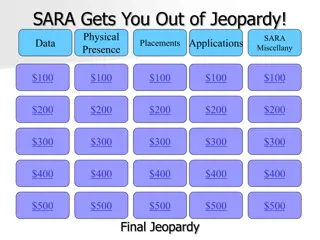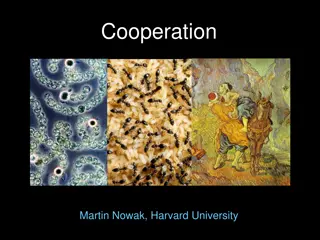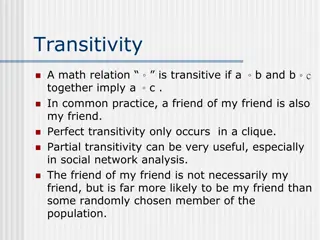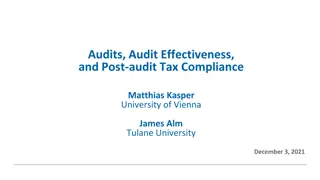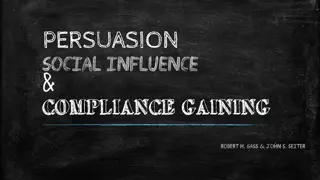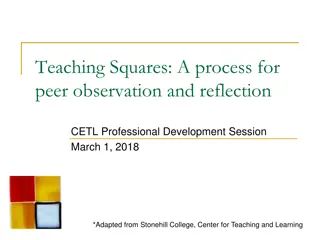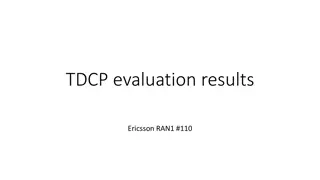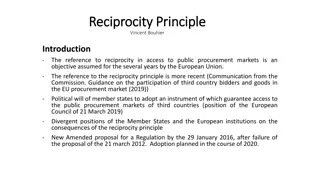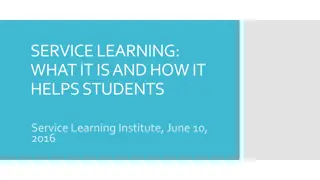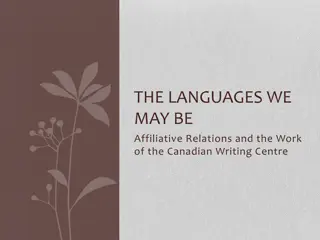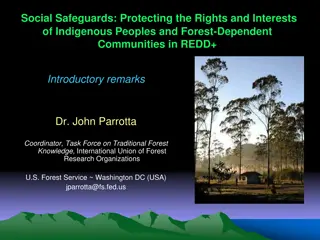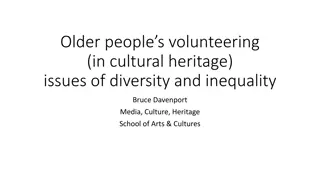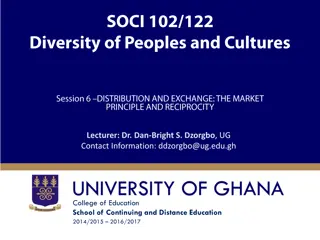Understanding Co-Production in Public Services
Co-production in public services involves a collaborative approach where all stakeholders work together on an equal basis to design and deliver services. This method focuses on building on people's existing capabilities, promoting reciprocity and mutual support, and blurring distinctions between pro
3 views • 15 slides
Autism - What is it and how can you support an autistic person?
Autism Spectrum Disorder (ASD) is assessed using DSM-5 criteria, focusing on impairments in emotional reciprocity, relationships, and communication. Individuals may also display difficulties in movements, routines, interests, and sensory needs. Beyond ASD, considerations include ADHD, anxiety disord
3 views • 24 slides
Socio-Cultural Features of Village Community in India
The traditional village community in India was historically self-sufficient, with its own production and consumption units. Over time, changes have led to increased interactions among villages, diminishing self-sufficiency. Factors like multi-caste populations, markets, pilgrimages, and pilgrimages
3 views • 18 slides
Understanding Maxwell Equations in Thermodynamics
In thermodynamics, Maxwell equations are derived using Euler's reciprocity relation. They involve characteristic functions such as internal energy, free energy, enthalpy, and Gibbs free energy, along with parameters like temperature, entropy, pressure, and volume. These equations form the foundation
0 views • 15 slides
Grassroots Innovation for Sustainable Village Development
PALLE SRUJANA, an initiative started in November 2005, fosters grassroots creativity to offer cost-effective solutions to villagers. Emphasizing the pursuit of happiness, innovation, and world peace, the organization promotes affordable and user-friendly ideas that enhance the quality of life. Throu
0 views • 29 slides
Tips for Being a Great Pupil at Markeaton Primary School
Discover the Markeaton MINDS skills that will help you excel at Markeaton Primary School: More than just me (Reciprocity), I can do it (Resilience), Now what (Reflectiveness), Doing it myself (Responsibility), Solving problems (Resourcefulness). Learn how to listen, collaborate, work hard, be respon
0 views • 9 slides
The Lion and the Mouse: A Tale of Kindness and Help
In this classic story, a lion's nap is disturbed by a tiny mouse, leading to an unexpected display of kindness and assistance. The mouse, once spared by the lion, later returns the favor by helping the king of the jungle. Through simple yet powerful acts, the importance of forgiveness, gratitude, an
0 views • 5 slides
Understanding Fourier Transforms and Properties
Fourier transforms play a crucial role in signal processing by transforming signals between time and frequency domains. This outline covers the basics of Fourier transforms, discrete Fourier transforms, Fourier series, properties like symmetry and reciprocity, resolution in time and frequency, the D
0 views • 5 slides
Enhancing Student Success through Service-Learning Initiatives
Explore how service-learning can positively impact student success by integrating real-world experiences into educational settings, promoting student engagement, fostering critical thinking skills, and empowering students to be part of the solution to societal challenges. This presentation discusses
0 views • 40 slides
Unfolding the Present of Presence in Street Chaplaincy: Analyzing Case Studies by Niels den Toom, Ph.D.
This analysis delves into the essence of presence in street chaplaincy through case studies. It explores the empirical study with street chaplains, emphasizing the relational focus and holistic approach. The Presence Theory developed by Andries Baart is discussed, highlighting the challenges and suc
0 views • 11 slides
Understanding Tax Morale and the Shadow Economy in Greece
Tax morale plays a crucial role in determining the size of the shadow economy in Greece. Factors such as unemployment, tax burden, and self-employment also influence the shadow economy. Tax compliance decisions are driven not only by enforcement but also by tax morale. Various determinants of tax mo
0 views • 21 slides
Exploring Papua New Guinea: Fieldwork and Cultural Diversity
Delve into the rich cultural tapestry of Papua New Guinea through discussions on fieldwork modes of production, kinship, reciprocity, gift exchange, and markets. Gain insights into the unique challenges faced by rainforests in Amazon, Central Africa, and Southeast Asia, emphasizing their crucial rol
0 views • 6 slides
Understanding Prosocial Behavior and Why People Choose to Help
Prosocial behavior, including altruism, involves acts that benefit others without expecting personal gain. People choose to help due to evolutionary psychology, social norms, social exchange theory, and the empathy-altruism hypothesis. Various factors like reciprocity, rewards, and empathy influence
0 views • 22 slides
Implicit Sounding Calibration in IEEE 802.11-19/1193r0
Proposal to consider implicit sounding in TGbe to reduce overhead for 16ss and multi-AP cases. The calibration accuracy is crucial to maintain channel reciprocity. Lab test results demonstrate the feasibility of implicit sounding. The document discusses absolute and relative calibration methods in 8
0 views • 11 slides
WAQTC - Leadership, Cooperation, Quality
Providing leadership in transportation construction quality improvement through cooperation among member agencies such as CFL and WFL AKDOT&PF, CDOT, ITD, MDT, ODOT, UDOT, and WSDOT. WAQTC focuses on standardizing test methods, developing AASHTO standards, offering training and qualification program
0 views • 8 slides
Proposed Amendments to Educator Licensure and Renewal Regulations
The proposed amendments aim to streamline licensure regulations, strengthen requirements, and reduce unnecessary burden while maintaining high standards. Examples include changes in reciprocity, flexibility in earning PDPs, closing loopholes, and reducing/eliminating regulatory burden. Additionally,
0 views • 9 slides
SARA Gets You Out of Jeopardy! Physical Presence Data
In this collection of questions and answers related to SARA (State Authorization Reciprocity Agreement), you will find information on enrollment data reporting, SARA institution requirements, student complaints reporting, and scenarios determining SARA coverage. These topics cover aspects of institu
0 views • 27 slides
Evolutionary Dynamics of Cooperation by Martin Nowak at Harvard University
Explore the evolution of cooperation from the origins of life to human behavior with a focus on mechanisms such as natural selection, direct reciprocity, and the Prisoner's Dilemma. Learn how populations evolve through mutation, selection, and the interplay between cooperation and defection in vario
0 views • 50 slides
Understanding Transitivity and Clustering Coefficient in Social Networks
Transitivity in math relations signifies a chain of connectedness where the friend of a friend might likely be one's friend, particularly in social network analysis. The clustering coefficient measures the likelihood of interconnected nodes and their relationships in a network, highlighting the stru
0 views • 8 slides
Understanding the Impact of Audits on Post-Audit Tax Compliance
Audits have direct and indirect effects on taxpayers, influencing compliance behaviors. While more audits generally lead to increased compliance, outcomes can be ambiguous, with some studies showing a decline in post-audit compliance. Behavioral responses to tax audits are driven by perceived risks
0 views • 15 slides
Strategies for Effective Social Influence and Compliance in Persuasion
In "Persuasion, Social Influence & Compliance Gaining" by Robert H. Gass and John S. Seiter, Chapter 11 explores sequential persuasion tactics such as pregiving and the foot-in-the-door technique. Pregiving, where favors or gifts create a sense of indebtedness, is effective due to factors like likin
0 views • 14 slides
Peer Observation and Reflection in Teaching Squares
Teaching Squares is a collaborative process for reciprocal peer observation and reflection in the context of professional development. It involves non-evaluative steps such as an initial meeting, three classroom visits, and a square share discussion. Best practices include creating cross-disciplinar
0 views • 6 slides
Wireless Communication Evaluation Results and Channel Characteristics Analysis
This content discusses TDCP evaluation results in Ericsson RAN1, comparing precoding based on reciprocity versus CSI feedback. It also explores autocorrelation versus Doppler shift, Doppler spread estimation based on channel peaks, and proposed descriptions for AltA and AltB methods. The analysis de
0 views • 6 slides
Evaluating Microblog Content: Who Gives a Tweet?
This study delves into the evaluation of microblog content value by analyzing feedback from followers and strangers on Twitter. The research explores the content that is valued and why, examining design implications, emerging norms, and practices in the online space. The study also discusses anticip
0 views • 44 slides
Understanding Community-Engaged Research for Meaningful Collaboration
Explore the principles and benefits of community-engaged research as a collaborative process conducted with diverse community partners for mutual knowledge exchange and meaningful outcomes. Discover how this approach differs from community-focused research and why it fosters partnership and reciproc
0 views • 13 slides
Understanding the Reciprocity Principle in Public Procurement Markets
The concept of reciprocity in access to public procurement markets, particularly in the European Union, has gained prominence in recent years. This principle involves mutual opening obligations for public procurement markets while considering concessions and exceptions, such as excluding defense and
0 views • 4 slides
Understanding Service Learning: Benefits and Reflections
Service learning is a method that combines community service with academic learning, personal growth, and civic responsibility. Benefits include improved relationships, retention of material, self-confidence, and soft skill acquisition. It emphasizes respect, reciprocity, relevance, and reflection.
0 views • 16 slides
Cultivating Multilingual Teaching for a Just World
Balancing short-term student needs with long-term responsibilities, this approach embraces equity, language diversity, and rhetorical agency to foster a fairer educational landscape for present and future generations. Emphasizing reciprocity and courage in teaching relationships, it seeks to challen
0 views • 6 slides
Reflections on Giving and Receiving
Reflect on the interconnected nature of giving and receiving in life, drawing inspiration from quotes about the law of giving, the power of generosity, and the importance of balance in various aspects of living. Explore the idea of reciprocity and the beauty of both giving and receiving in this coll
0 views • 9 slides
Safeguarding Indigenous Peoples and Forest Communities in REDD+
Exploring traditional forest knowledge and its importance to culture, livelihoods, and conservation efforts. The IUFRO Task Force focuses on preserving traditional knowledge, addressing threats, and identifying opportunities for collaboration with modern forest science. Unique features include susta
0 views • 10 slides
Exploring Diversity and Inequality in Older People's Volunteering in Cultural Heritage
Older volunteers play a crucial role in cultural heritage organizations, but issues of diversity and inequality persist. The relationship between volunteer-involving organizations and older volunteers raises questions about reciprocity and moral obligations. Barriers to involvement, including the co
0 views • 6 slides
Understanding Distribution and Exchange in Different Societies
This session led by Dr. Dan-Bright S. Dzorgbo at the University of Ghana explores how various societies handle the distribution and exchange of goods and services. It delves into the roles of market principles and reciprocity, shedding light on different approaches to economic systems. Through discu
0 views • 12 slides

